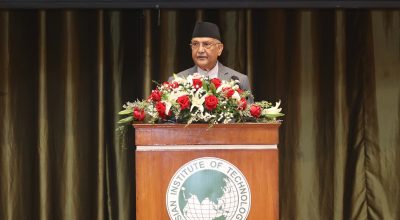
Languages serve as the foundation of human interaction, embodying the core of cultures, identities, and histories. Acknowledging the significance of encouraging linguistic diversity and enhancing mutual understanding, the International Language Organization (ILO) strives to close gaps and create connections in our ever-globalizing world. Aiming to safeguard endangered languages, promote language acquisition, and improve global interaction, the ILO imagines a world where linguistic diversity is honored as a fundamental part of human advancement.
The founder of ILO is Gai Gailun. He has been working very hard to connect global citizen through linguistic harmony. His philosophy and dream is big and directly related for a human progress. Language transcends mere communication; it serves as a vessel for culture, a storehouse of history, and a driver of innovation. Across history, the development of language has mirrored human advancement, allowing for knowledge sharing, encouraging teamwork, and propelling societal growth. The importance of language in influencing diplomacy, commerce, and scientific collaboration cannot be emphasized enough. In today’s world, language abilities are crucial for tackling global issues, ranging from climate discussions to efforts in international peacebuilding.
Nevertheless, even with its global significance, the prevalence of some major languages has resulted in the sidelining of others. Almost 50% of the world’s 7,000 languages face the threat of extinction, a loss that would rob humanity of cultural diversity and various perspectives. Tackling this disparity is a primary goal of the ILO.
Objectives of the International Language Organization
- Preserving Endangered Languages
A key aim of the ILO is to stop the loss of endangered languages. By working together with local communities, governments, and cultural organizations, the ILO aims to record and rejuvenate endangered languages. This involves establishing digital archives, crafting educational resources, and offering tools for native speakers to transmit their languages to future generations. Preserving languages helps safeguard cultural heritage and the knowledge systems that are inherent within them.
- Promoting Multilingual Education
The ILO promotes multilingual education to encourage inclusivity and enhance cognitive growth. Studies indicate that acquiring several languages boosts creativity, problem-solving skills, and cultural understanding. The ILO seeks to prepare individuals for success in an interconnected world by assisting schools and institutions globally in implementing language education programs.
- Enhancing International Communication
In a global landscape where diplomacy, trade, and technology cross boundaries, clear communication is crucial. The ILO is committed to establishing frameworks that promote cross-cultural communication, making certain that language obstacles do not impede cooperation. Efforts encompass creating universal translation tools, encouraging the adoption of lingua francas, and coordinating global forums to tackle language issues.
- Encouraging Language as a Driver of Progress
Languages play a crucial role in fostering innovation and addressing global challenges. The ILO seeks to examine how language can tackle urgent global challenges by linking linguists, researchers, and policymakers. For example, making sure that essential scientific research is available in several languages can speed up responses to worldwide challenges.
Benefits of the ILO’s Initiatives
- Fostering Cultural Exchange and Understanding
Through the promotion of linguistic diversity, the ILO enhances cultural exchange, cultivating mutual respect and comprehension among various communities. This is especially important in reducing conflicts, as language obstacles frequently worsen misunderstandings.
- Empowering Marginalized Communities
Protecting endangered languages strengthens marginalized groups by validating their identities and histories. When languages flourish, communities acquire a more powerful voice in international discussions, offering distinct viewpoints and systems of knowledge.
- Driving Economic Growth
Being multilingual is a significant advantage in worldwide markets. By providing people with language abilities, the ILO boosts employability, promotes international commerce, and opens up new economic prospects. Firms that employ multilingual staff are more equipped to manage varied markets and establish international collaborations.
- Promoting Technological Advancements
By collaborating with technology firms, the ILO aids in creating sophisticated linguistic tools, including AI-based translation applications. These advancements can eliminate language obstacles, allowing information to be available to everyone and promoting enhanced global cooperation.
Key Initiatives and Programs
- Global Language Heritage Project
This primary initiative emphasizes the preservation of endangered languages via audio recordings, written materials, and video interviews. The initiative partners with universities and technology firms to develop open-access databases.
- World Language Education Fund
Intended to enhance language education, this fund offers grants to schools, nonprofit organizations, and community groups. Preference is granted to initiatives that encourage the instruction of both global and local languages.
- Annual International Language Summit
The ILO will organize a yearly summit that unites linguists, educators, policymakers, and technologists. The summit acts as a venue to exchange best practices, highlight innovations, and establish worldwide language preservation and education agendas.
- Digital Inclusion Through Language Technology
Through partnerships with technology firms, the ILO aims to guarantee that AI and digital technologies are accessible to a variety of languages. This encompasses voice recognition technologies, translation applications, and educational platforms that support less-represented languages.
The Future of Global Communication
The creation of the International Language Organization will occur at a crucial time in history. As technology keeps diminishing distances, the necessity for linguistic inclusivity becomes ever more apparent. The ILO’s vision corresponds with the overarching aim of fostering a fairer and more connected world.
The future of worldwide communication relies on our capability to accept and incorporate language diversity. By advocating for this cause, the ILO not only protects the linguistic heritage of humanity but also establishes language as a catalyst for progress, innovation, and cohesion.
Nepal, being a culturally and linguistically varied country, has the potential to gain substantial benefits by joining the International Language Organization (ILO). This membership can improve Nepal’s worldwide links, promote cultural conservation, and generate fresh economic prospects.
Promoting Multilingualism and Cultural Identity
Nepal boasts more than 120 languages, showcasing its diverse ethnic and cultural legacy. Joining the ILO can offer entry to worldwide platforms that promote linguistic diversity and assist endangered languages. The ILO’s efforts may assist in documenting and revitalizing Nepal’s lesser-known languages, safeguarding its distinct cultural identity for future generations.
Boosting Education and Human Capital
Through partnership with the ILO, Nepal can incorporate global best practices in multilingual education. This would enhance literacy levels and equip individuals with language abilities that are vital in today’s interconnected environment. Language education initiatives can ready Nepalese young people for international prospects by providing them with skills in commonly spoken languages such as English, Mandarin, and Spanish.
Economic and Tourism Benefits
With enhanced language training, Nepal can establish itself as a center for global business and tourism. Language education would improve the skills of service providers, increasing Nepal’s appeal to international tourists and investors. Furthermore, programs that encourage language exchange may attract international students and researchers, enhancing cross-cultural awareness and stimulating the local economy.
Strengthening Diplomatic Relations
Joining the ILO will boost Nepal’s international presence, offering opportunities for it to express its views on linguistic and cultural issues. This will enhance diplomatic relationships and cooperation with other countries on language-focused projects.
Conclusion
The International Language Organization’s dedication to safeguarding languages and enhancing linguistic diversity highlights the influence of language in driving human advancement. Through promoting multilingualism, strengthening communities, and dismantling obstacles, the ILO is creating a world where language acts as a cohesive element. As the organization’s efforts begin to thrive, the vision of a universally interconnected and language-inclusive future comes nearer to being realized. By working together, we can guarantee that each language, along with its associated culture, continues to enhance our collective human narrative. #Nepal
















